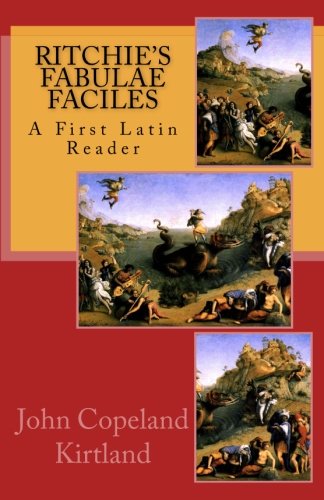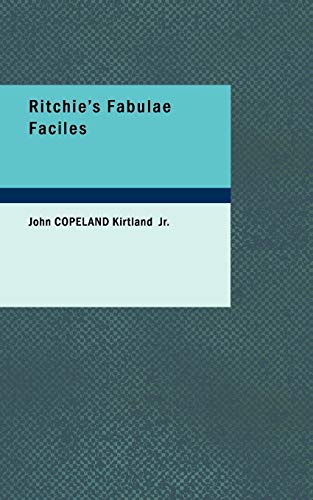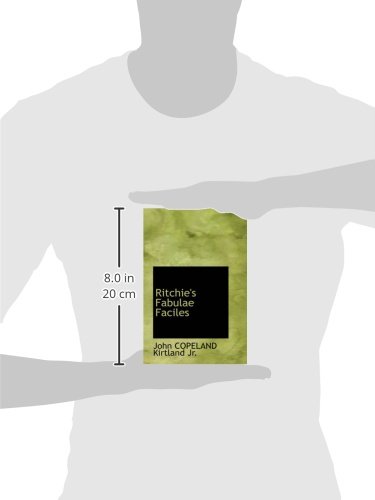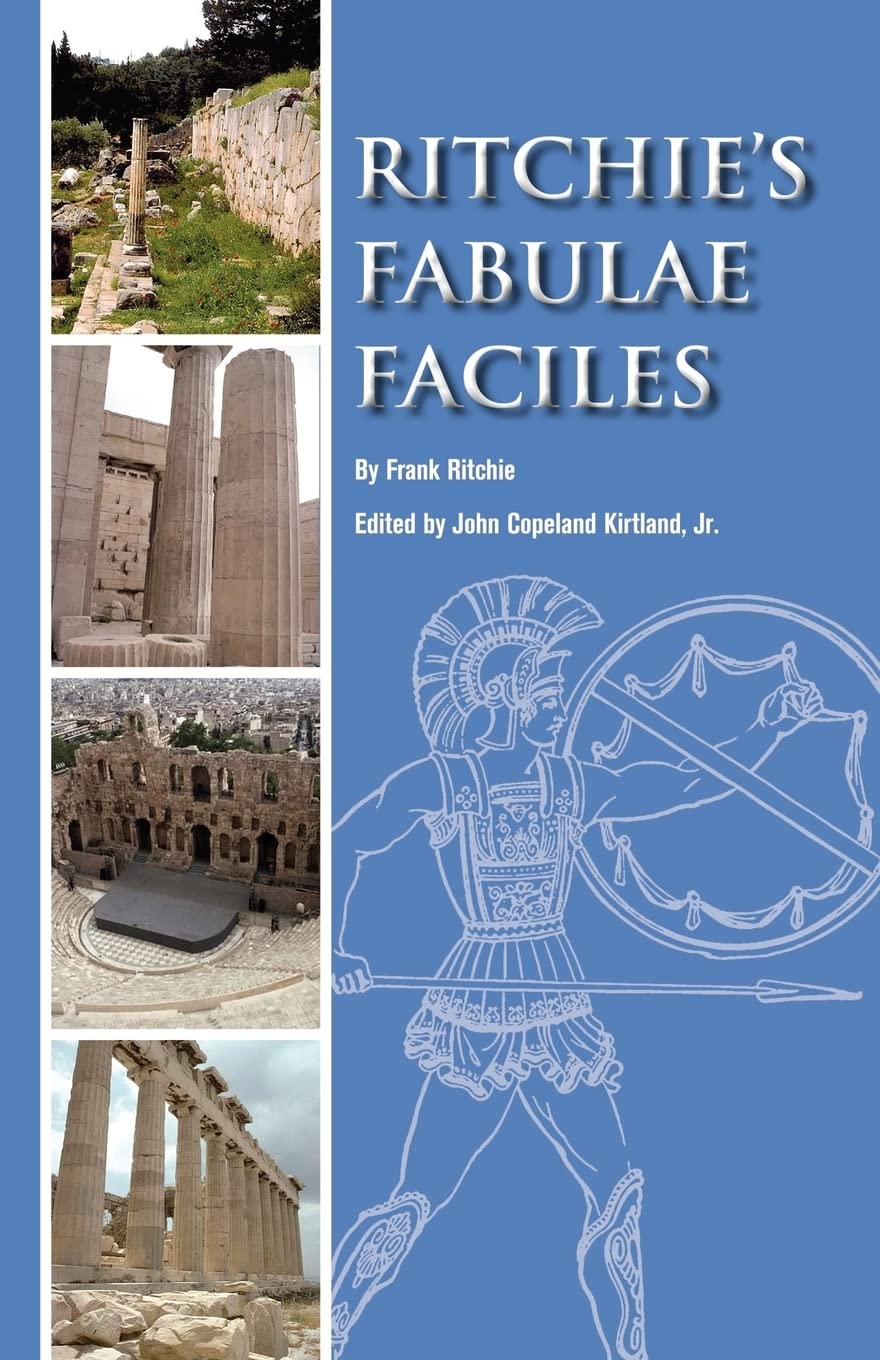from the PREFACE: Some time ago a fellow-teacher brought the Fabulae Faciles to my notice, and I have since used two of them each year with my class of beginners in Latin with increasing appreciation. Indeed, I know nothing better to introduce the student into the reading of connected narrative, and to bridge the great gulf between the beginner’s book of the prevailing type and the Latinity of Caesar or Nepos. They are adapted to this use not merely by reason of their simplicity and interest, but more particularly by the graduating of difficulties and the large use of Caesarian words and phrases to which Mr. Ritchie calls attention in his preface. Doubtless many American teachers have become familiar with portions of the Fabulae, for they have been freely drawn upon in several Latin readers recently published in this country. I venture to hope that those who have made the acquaintance of the work in this way will welcome a complete edition. In England the little book has had a large use. Its pedagogical excellencies are well summed up in a letter addressed to Mr. Ritchie by the Very Rev. E.C. Wickham, formerly Head-Master of Wellington College, the well-known editor of Horace:– “It launches the student at once in ancient life. The old classical stories, simply told, seem to me much the best material for early Latin reading. They are abundantly interesting; they are taken for granted in the real literature of the language; and they can be told without starting the beginner on a wrong track by a barbarous mixture of ancient and modern ideas. “It combines, if I may say so, very skilfully, the interest of a continuous story, with the gradual and progressive introduction of constructions and idioms. These seem to me to be introduced at the right moment, and to be played upon long enough to make them thoroughly familiar.” In revising Mr. Ritchie’s book for the use of American schools it has seemed best to make extensive changes. Long vowels have been marked throughout, and the orthography of Latin words has been brought into conformity with our practice. Many liberties have been taken with the text itself, especially in the latter part, in the way of making it approximate more closely to our rather strict notions of the standards of model prose. A few words and uses of words not found in the prose writers of the republic have been retained, but nothing, it is hoped, that will seriously mislead the young student. I shall welcome any criticism that may lead to further changes in the text in future editions. The notes are entirely new, and are intended for students who have but just finished the beginner’s book or have not yet finished it. Some notes may appear at first sight unnecessary or unnecessarily hard, but the reason for their insertion should be evident when the student begins the reading of classical Latin, the difficulties of which will be less likely to appal the beginner if some of them have been already conquered. I believe it a mistake to postpone all treatment of the uses of the subjunctive, for instance, or of the constructions of indirect discourse until the study of Nepos or Caesar is begun. Besides, it is easier to neglect notes than to supply them, and the teacher who prefers to do the first reading without much attention to the more difficult constructions will only need to tell his students to disregard certain of my notes–or all of them. There are no references to the grammars, but syntax has been given such treatment as seemed needed to supplement its treatment in the beginner’s book. Teachers will therefore be able to postpone the use of a formal manual of grammar, if they so desire.
Ritchie’s Fabulae Faciles: A First Latin Reader
$13.79
This book serves as an introductory reader for students beginning to study Latin, building translation and comprehension skills.
Ritchie’s Fabulae Faciles: A First Latin Reader
$15.00
This book serves as an introductory Latin reader, helping students develop foreign language skills through classical myths.
The most beautiful and delightful of all myths are those that have come down to us in the remains of the literature and the art of ancient Greece and Rome; they are also the most important to us, for many of the great masterpieces of English literature and of modern art have been inspired by them and cannot be understood and appreciated by one ignorant of classical mythology.
Features
- Used Book in Good Condition
Additional information
| Weight | 0.159 lbs |
|---|---|
| Dimensions | 12.7 × 0.9 × 20.3 in |
Reviews
There are no reviews yet.
Ritchie’s Fabulae Faciles: A First Latin Reader
$8.24
This book serves as a reader to help intermediate Latin students build their language and comprehension skills.
Targeting intermediate Latin students who have a grasp of grammar and vocabulary, Frank Ritchie took the classic Greek myths of Perseus, Hercules, Jason and the Argonauts, and Ulysses and divided them into 100 easy-to-read stories. This edition is has been retypeset and reformatted. The notes, previously in the back of the book, have been converted to footnotes and are easier to find since they are now on the relevant page. Out of necessity, the notes have been edited and no longer match the notes from the original edition.
Features
- Used Book in Good Condition
Additional information
| Weight | 0.159 lbs |
|---|---|
| Dimensions | 14 × 0.6 × 21.6 in |
Reviews
There are no reviews yet.
Ritchie’s Fabulae Faciles: A First Latin Reader
$18.95
This book is an introductory reader designed to help students learn the Latin language.
Additional information
| Weight | 1.05 lbs |
|---|---|
| Dimensions | 15.6 × 0.9 × 23.4 in |
Reviews
There are no reviews yet.























Reviews
There are no reviews yet.